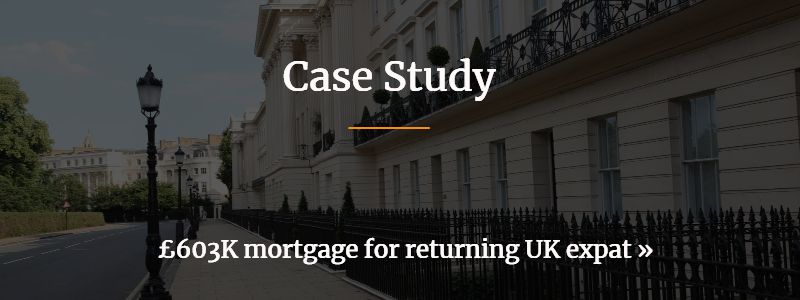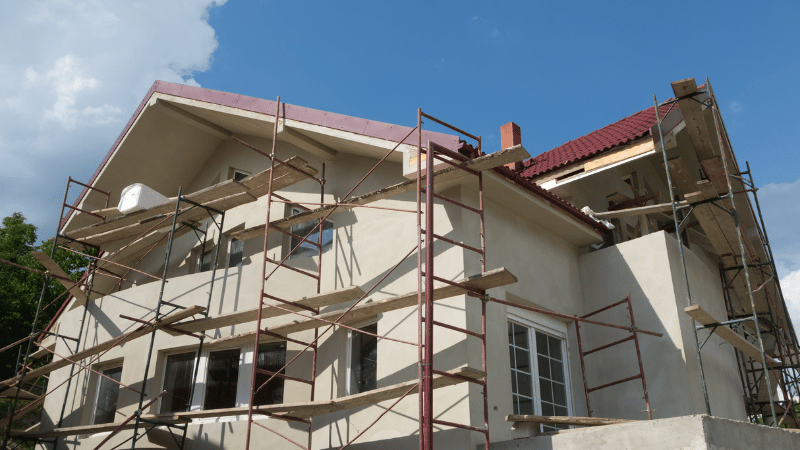Categories
How To Get A Mortgage If You Are An Expat Returning to The UK

Many expats that live and work outside of the UK return within a few years looking to purchase a residential property in the UK.
But getting an expat mortgage through a traditional lender if you live & work abroad may not be as easy as you think.
Below we review the factors that can make it difficult to secure an expat mortgage through a traditional lender when coming back to the UK from abroad.
And while you're here, don't forget to check out our complete guide on mortgages for UK expats.
Income
The income you receive from your current employment will affect your ability to get an expat mortgage in the UK through a traditional lender.
Complex income
It is not uncommon for British expats to struggle with getting a mortgage that accurately reflects their income. Typically, UK traditional lenders do not have the expertise or the experience to deal with British expats’ unique requirements.
One of the major failings of traditional lenders is their inability to deal with complex income streams.
A traditional lender may not be able to provide a mortgage that takes into account your entire income if you receive income from stocks, shares, pensions or other properties. This could leave you with a much small mortgage than what's actually available to you.
Specialist lenders and complex income...
If you have a complex stream of income, or you have multiple streams of income, you may still be able to get an expat mortgage that truly reflects what you can afford.
We work with a number of specialist lenders who are prepared to provide expats with mortgages. The lenders we work with are specialists and have a vast amount of experience in sourcing mortgages for expats with complex income structures.

Foreign currency earnings
As a returning expat, the currency that you are paid in determines how likely you are to secure a mortgage with a traditional lender.
Depending on your employer, you may be paid in sterling. If you are paid in the British pound, then getting a mortgage may be more straightforward; this is especially the case if you already have financial obligations in the UK.
However, if you are paid in foreign currency, then you may struggle to get an expat mortgage from a traditional lender.
European law and foreign currency mortgages...
In February 2014, the European Commission introduced new rules surrounding the mortgage lending market through their Mortgage Credit Directive (MCD).
The MCD required all of the European member states to ensure that their domestic law reflected the new rules.
At the time the MCD was introduced, the UK was a member of the EU and thus had to ensure that they complied with EU law. By 2016, the UK had embedded the EU requirements into the mortgage lending market completely.
This meant that the effects of the MCD were felt by the mortgage market as a whole. As a direct result, many high street banks changed their view on foreign currency mortgages; this altered the likelihood of expats sourcing mortgages through traditional lenders in the future.

What the MCD entails...
Due to the rules enforced by UK law to comply with the MCD, British expats may find it harder to secure a mortgage if they are paid in foreign currency.
Section 2A.3.1(1) and (2) are the most relevant sections of the MCD, as they affect the mortgage lending market in relation to foreign currency.
Below is a direct excerpt from both sections.
Where an MCD regulated mortgage contract relates to a foreign currency loan ... the MCD mortgage lender must ensure:
Section 2A.3.1(1) the consumer has a right to convert the MCD regulated mortgage contract into an alternative currency under specified conditions; or
Section 2A.3.1(2) there are other arrangements in place to limit the exchange rate risk to which the consumer is exposed under the MCD regulated mortgage contract

How Section 2A.3.1 affects your mortgage...
Under Section 2A.3.1(1), borrowers will have the freedom to change their mortgage from one currency to another at any point in the mortgage agreement.
Therefore, in the event that there is a sudden change in the currency resulting in a spike in an exchange rate, a borrower could substantially increase the value of their salary by exchanging the currency they are paid in to a more favourable one.
In addition to this freedom the MCD affords the borrowers, Section 2A.3.1 (2) places an obligation on lenders to have an arrangement in place in case the value of the currency which the consumer is paid in drops dramatically against sterling or vice versa.
This means that under the rules introduced by the MCD, borrowers could benefit from an increase of the value of their salary and also would receive protection, to an extent, by their mortgage provider in the case of a sudden drop in the value of their salary.
Effectively, the MCD permits the borrower to move their mortgage to a more favourable currency if they can show that the mortgage is no longer affordable.
Traditional lenders' response to the MCD...
The majority of lenders believe that the MCD gives borrowers too much protection and freedom, whilst pushing more risk on the lenders.
This is because Section 2A.3.1 places an obligation on the lenders to put an arrangement in place to protect the borrowers against the exchange rate risk.
An arrangement the lenders may have to have in place is a cap on the exchange rate's effect on the borrower's mortgage.
For example, this could be where a lender agrees to absorb any exchange rate percentage drop over 15%. If such an agreement was in place, this would mean in the event that the exchange rate drops by 30%, the borrower would incur the cost of 15% of the decrease and the lender would take on the remaining 15% of the exchange rate drop.
Due to the additional risk that lenders would have to take on to provide foreign currency mortgages, a vast number of traditional lenders have become reluctant to offer foreign currency mortgages to expats. The majority of lenders that previously offered foreign currency mortgages argue that they are just no longer cost-effective and are too risky.
The bottom line is that lenders are not prepared to take on the risk required for a foreign currency mortgage; therefore, foreign currency mortgages in the high street are no longer readily accessible.

But are there are still accessible foreign currency mortgages out there?
Despite the introduction of the MCD rules to the mortgage market, it is still possible to access a foreign currency mortgage.
There are lenders willing to provide foreign currency mortgages to expats with foreign salaries.
If you want to contact a specialist lender for a foreign currency mortgage, then it is advisable to contact a professional mortgage broker.
A good broker will be able to provide a breakdown of the foreign currency mortgages available to you. In addition, they will be able to identify the best mortgage for your needs - ultimately saving you time and money.
Credit history and expat mortgages
A key stumbling block for many lenders when underwriting a mortgage application is where it is difficult to assess credit history. The majority of lenders will not provide a mortgage for an expat if this is the case.
This is because traditional lenders, such as banks or building societies, require sight of your credit history. This might be an issue for you, as spending time out of the UK can have an adverse effect on your credit history - you might have gaps in payment records or not have held a UK bank account for some time.
Improve your credit history...
There are ways to improve your credit rating if you have been living abroad.
Firstly, you need to find out your current credit rating. A credit rating is illustrated by a number between 0 and 999. If you have a low number, anywhere between 0 and 700, then you do not have a good credit rating.
It is important to know your credit rating to find out exactly how much you have to improve it. You can access your credit rating from various websites including Experian.
Secondly, your credit rating could improve if you get a UK address. This does not necessarily mean that you have to buy or rent a property yourself, as you may be able to register your parent's or a family member's address as your UK address.
The longer you have a registered UK address, the better your credit rating will be.
Thirdly, ensure that all late payments are resolved. Whether it's on a utility bill or a mortgage, there are many reasons why you may have missed a payment. It is important to pay any outstanding bills straight away.
It is possible to minimise the effect of a late payment on your credit rating; you can apply for a ‘notice of correction’ to be applied to your credit report. A notice of correction is a statement on your credit rating that explains in detail as to why the payments were missed.
If you are an expat in need of a notice of correction, you could explain that payments were made late because of the move to another country.
Although we work with lenders that do not prioritise credit ratings, improving your credit rating could help expedite the expat mortgage process.
For more on your credit score and how to improve it: How To Get a Mortgage - 19 Top Tips for Borrowers

No credit history, no problem...
As a specialist property finance broker, we work with a number of lenders who can help expats get the mortgage they need, even with a low credit score.
Unlike traditional lenders who focus on the credit history of the applicant, specialist lenders we work with are willing to provide an expat mortgage based on the applicant's unique set of circumstances, such as their income and deposit.
Loan to Value and expat mortgage applications
Getting the right Loan to Value (LTV) on your expat mortgage is crucial for securing the property you want.
Due to inexperience and lack of expertise, traditional lenders are not able to provide expat mortgages with high LTVs compared to specialist providers.
In the rare occasions that traditional lenders offer expat mortgages, they may only offer up to 60% LTV. This could leave you without the full finance you need.
Getting the right LTV...
Although some lenders may initially accept an expat mortgage application, they may reject them later on if their strict lending criteria cannot be met.
Fortunately, we work with a number of lenders that are prepared to provide expat mortgages with higher LTV ratios.
There is no definitive guide to how much you could secure through an expat lender.
However, as a rule of thumb, our table below shows what can generally be secured based on your employment.
| Employment Status | Max LTV |
| Self Employed | 75% |
| Contractor | 85% |
| Employed | 85% |
| Employed (Spouse in UK) | 90% |
| Employed (Returning to UK) | 90% |
Clifton Private Finance
As a specialist property financial broker, we have experience in helping expats get the mortgage they need for their purchase.
Through our strong relationships with high street and private banks and specialist lenders, we can help you get the expat mortgage that suits your requirements.
Case study: Foreign income, high LTV expat mortgage
The scenario…
Our client, an expat who lived and worked in the USA for 10 years, wanted to move back to the UK with his wife and two children.
The client was going to move back to the UK and work for the same company as he had done in America.
The client found a property in the UK for £710,000.
To purchase the property, they needed an expat mortgage at 85% LTV.
To make matters more complex, the client's salary was in dollars.
Unfortunately, due to his foreign salary and high LTV, he was turned away by traditional lenders.
The solution…
We were able to arrange an expat mortgage for our client without delay.
We used a lender that was able to provide the 85% LTV expat mortgage to enable our client to move back and purchase their dream property in the UK
We negotiated and secured a standard mortgage rate (as opposed to the much higher expat mortgage rate), as the lender was prepared to take into account the client's future sterling paid salary.
If you need an expat mortgage, call us on +44 203 900 4322 or fill in our callback form.











